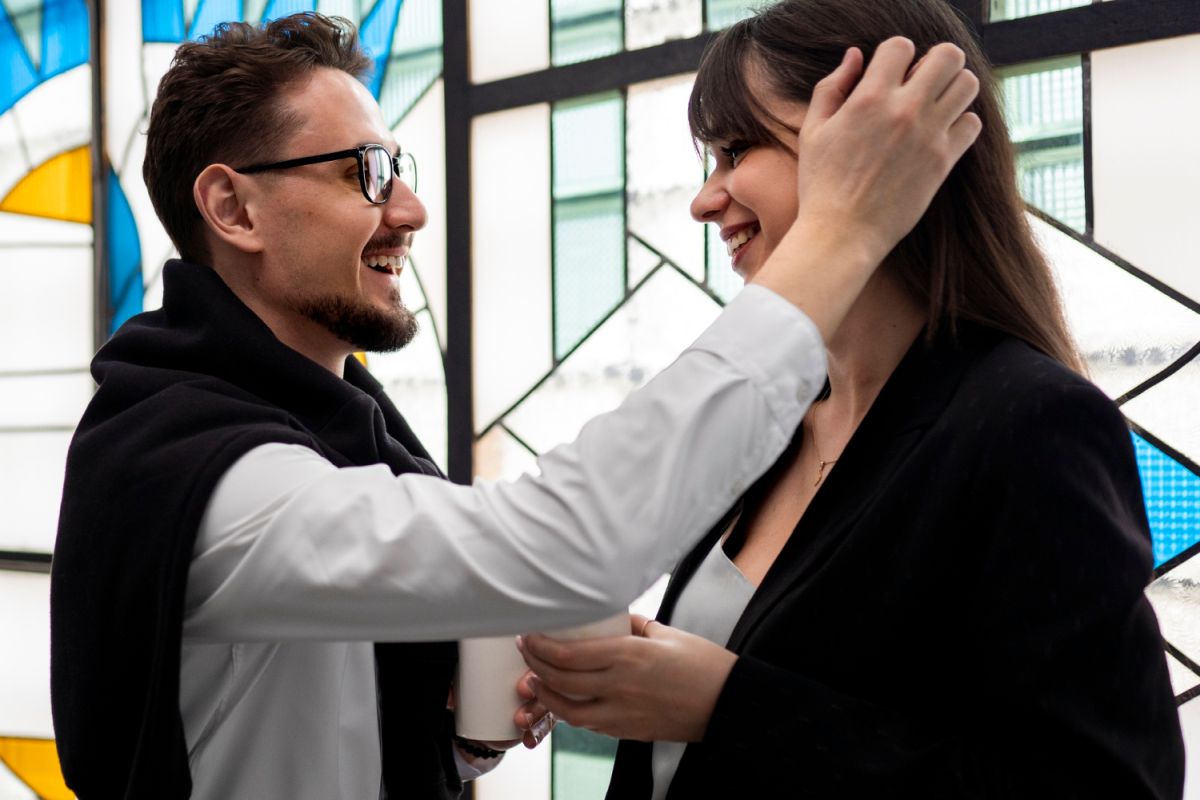
Feeling Guilty for Letting Him Touch Me: My Experience
So, here’s the thing: sometimes we find ourselves in situations that we didn’t plan for. And when those situations involve someone we care about crossing a line, it can leave us feeling a whole mix of emotions. In this article, I’m going to share my experience of feeling guilty for letting him touch me. It’s a topic that doesn’t get talked about enough, but one that’s important to shed light on. So, grab a cup of tea and let’s dive in.
1. Reflecting on the Early Signs: My Battle with Unwanted Touches
As I look back, I can identify the red flags that marked the beginning of that difficult phase of my life. I often found myself in uncomfortable situations where the lines of personal boundaries were frequently being blurred. These experiences ranged from mild, seemingly innocuous encounters to ones that left me feeling violated and helpless.
- The first of these signs was the constant invasion of my personal space. It began subtly; an accidental brush here, a lingering touch there. Even when there was plenty of space, some people found a way to ‘accidentally’ touch me. Acknowledging this instinctual unease was the first step in recognizing the problem.
- The second sign was the persistent feeling of unease. Even in my own space, I lived in perpetual alert, constantly wary of those around me.
One thing I’ve learned through this ordeal is that recognizing these patterns is crucial. Even subtler shifts in behavior can signal the beginning of unwanted advances. By sharing my experiences, I hope to equip others with the awareness necessary to spot these signs early on and take appropriate steps to ensure their safety.
2. The Emotional Aftermath: How Guilt Consumed Me Post-Incident
Following the incident, I was swallowed up by an overwhelming surge of guilt. It was as if a black hole had taken residence in the pit of my stomach, constantly pulling in every shred of self-worth and happiness. My mind evolved into a prison, a loop of echoing voices admonishing me for allowing him to cross the line.
I found myself sucked into questioning everything. Was it my fault for not being assertive enough? Did I invite it somehow unknowingly? The guilt began to consume my daily life. It became an unwanted guest during meals, latent in every conversation, and the last thought before the touch of sleep could provide a blessed oblivion. My confidence was in tatters, and the guilt made me feel wretched as if I was the sole perpetrator.
The most heartbreaking part is, I knew I wasn’t alone. Guilt has a unique way of isolating its victims, making them believe they’re the only ones shouldering such a burden. It took a colossal amount of strength to recognize this feeling, name it, and confront it head-on.
3. How I Hindered My Healing: The Trap of Victim Blaming
Why I Blamed Myself As anyone who has been through similar situations would understand, coming to terms with the experience was the farthest thing from easy. The guilt morphed into self-blame, a vicious cycle that I found myself entrapped in. Instead of acknowledging his unsolicited advances as violations, I delved into the devastating abyss of questions – ‘Why did I let him touch me?’ and ‘Was it my fault?’
Understanding the Blame Game Looking back, this self-deprecation was another trap sprouting from the core of victim-blaming, an ugly societal construct. It happens when victims of sexual harassment, or any type of violation for that matter, convince themselves that they invited or deserved the ill-treatment. This guilt-induced mind game was a significant roadblock in my healing journey.
The Cost of Victim Blaming In the long run, victim-blaming proved detrimental. It extended not just to my mental health, but seeped into my social dynamics, affecting relationships and interactions. The worst part? I was so engrossed in self-blame, that the real perpetrator escaped scrutiny. This unwarranted guilt was a misguided attempt at control – a horrible way of trying to regain the power I’d felt was stolen from me.
4. Seeking Therapy: Step Towards Overcoming Guilt and Shame
Under the heavy burden of guilt and shame, it’s easy to retreat into yourself and get lost in your feelings. But this phase of intense self-blame required a different approach – one that welcomed help from outside sources. For me, therapy was the crucial turning point.
Engaging with a professional therapist was initially intimidating, especially considering my habit of self-isolation. However, it provided a safe space where emotions are valued and acknowledged – where my feelings of transgression were patiently untangled and redefined. I learned that sexual assault isn’t simply a physical act—it’s about power and control. It’s not about desirability or ”asking for it” – clichés that society would have us believe.
Therapy is a personal journey, and every experience is unique, just as every individual is. It served as an eye-opener for me – carving my path towards acceptance and forgiveness, primarily towards myself. It taught me to embrace my emotions rather than fight them and replace false narratives with the truth - It was not my fault.
Guilt and shame are powerful, but they don’t have to control your narrative. Getting professional help isn’t a sign of weakness, and there’s no shame in asking for assistance in your healing journey.
5. Empowering Self: Lessons Learned and Advice for Others in Similar Situations
Looking back on my journey, I’ve met with many ups and downs. More crucially, I’ve learned a lot about myself and how to cope with my guilt and shame. Now, I want to reach out and offer some insights I’ve found invaluable during my healing process.
Firstly, and perhaps most importantly, you need to realize that you are not at fault. Yes, it sounds cliché, but truly internalizing this fact is the first crucial step towards moving on. You did not invite, nor did you deserve, what happened.
Secondly, be gentle with yourself. Give yourself the care, comfort, and empathy that you would offer a friend going through a tough time. Healing takes time and patience, and it’s perfectly okay to take that time for yourself.
Last but not least, never isolate yourself. Reach out to friends, family, or support groups who can provide the comfort and understanding you need. You’d be surprised to see how much love and support is out there waiting for you.
Remember, every person’s journey to empowerment is unique, but no matter what path you take, you are never alone on this road to recovery. You are strong, you are deserving, and, most importantly, you can overcome this.
Future Outlook
In closing, let me just say this – guilt can be a suffocating, powerful emotion that has the capacity to erode your self-confidence and happiness. We must all strive to push back against societal shaming and learn to value ourselves more. Going through my experience has taught me that guilt should never be the verdict for a victim’s emotional jury.
It’s important to remember that our self-worth isn’t determined by others’ actions. Major leaps are being made in both public discourse and personal narratives, but there’s still a lot of work to be done in breaking down the stigma and silencing that too often surrounds situations like mine.
Empowering ourselves involves recognizing our value and embracing our strength to press forward. I hope that by sharing my story, others who have had the same experiences will find some sense of solidarity, reassurance, and, hopefully, liberation. If you feel burdened by the guilt of similar experiences, please remember: you are not alone, you did nothing wrong, and there is help available – reach out, speak up, and let’s continue this conversation together, for the greater good of all.
Q&A
1. Why did you feel guilty for letting him touch you?
I felt guilty because I felt I had allowed a boundary to be crossed that wasn’t comfortable for me.
2. How did you cope with the guilt and discomfort?
The process was gradual. I sought professional help, practiced self-care, and started setting stronger boundaries.
3. When and how did you realize you had to talk about your experience?
I realized I needed to talk when the guilt was overwhelming my daily life. I shared my experience with trusted loved ones first, and then with a professional therapist.
4. Did sharing your experience with others help in any way?
Yes, sharing my experience enabled me to view the issue from different perspectives and also provided a sense of relief and support.
5. What advice would you give to someone who may be in a similar situation?
Trust your instincts and set boundaries that make you feel safe. If you’re feeling guilty or uncomfortable, seek help from a professional.
6. Was it just the physical touch that made you feel guilty?
Not entirely. It was more about the disrespect for my personal boundaries that led to the feelings of guilt.
7. Did writing about your experience help in your healing process?
Absolutely, writing was therapeutic and helped me understand and accept my feelings.
8. How has this experience affected your relationships?
It has led me to establish stronger boundaries and to be more assertive about my comfort and consent.
9. What do you want readers to take away from your story?
The importance of self-esteem, personal respect, and the courage to seek help when needed.
10. How important is it to seek professional help in such situations?
Incredibly important. Professionals can provide understanding, validation, and strategies to cope and heal.






